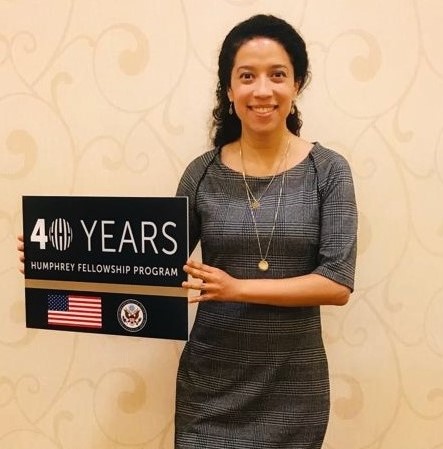
During May of 2020, the Center for Distributed Learning was honored to welcome the Hubert Humphrey Fellow Angelica Gabriela Rocha Guevara, the Director of Educational Innovation and Technology at the Universidad del Valle de Guatemala. She is one of two Humphrey Fellows selected from Guatemala in 2019, a first for the country’s and the program’s history.
Originally scheduled to be in Orlando for a face-to-face visit, like many others, her plans were altered due to the COVID-19 pandemic. Ms. Rocha touched base with us at UCF via Zoom from State College, Pennsylvania where she had been doing research at Penn State University.
While there, she was put in contact with the Division of Digital Learning Vice Provost Thomas Cavanagh and asked if she could tour our online learning programs. She has been interested in our work here after first hearing about UCF’s work in digital learning in 2012 because of our open educational resources TOPkit and Blendkit.
The Pegasus Innovation Lab (iLab) was excited to host her virtually and coordinated meetings with myriad departments across campus, including meetings with members in the Division of Digital Learning and various faculty members in the College of Science and the College of Engineering.
Angelica Rocha found the meetings both informative and useful as she was able to collaborate work between her university and ours to bring UCF’s Materia to UVG. As a reflection of her time with us, she has written an article outlining her professional affiliation with the University of Central Florida.
Start Small, Dream Big
Beginning my Professional Affiliation at UCF as a Hubert H. Humphrey Fellow
In January of 2019, the United States Embassy in Guatemala informed me of the great news that I had been selected to be part of the Fulbright Hubert H. Humphrey Fellowship, for the 2019-2020 academic year. “The Humphrey Program brings young and mid-career professionals from designated countries to the United States for a year of non-degree graduate-level study, leadership development, and professional collaboration with U.S. counterparts.”
Back home, I’m the Director of Educational Innovation and Technology at Universidad del Valle de Guatemala (UVG). A private university founded in 1996, well known in Central America for its quality programs in STEM fields. One of my goals for participating in this academic exchange, was to learn more about best practices and innovative strategies that could help my institution scale quality online and blended learning programs. Expanding access to postsecondary education is an important issue in my country, as most career majors are still offered primarily face-to-face at university campuses located in a few urban areas. Having admired UCF’s work for many years, consulting resources they had developed frequently, such as the TOPkit website and the Blendkit course, I was very excited when I was accepted to do my Humphrey Professional Affiliation at the Division of Digital Learning.
During my first meeting I was presented with two organizational charts composed of several departments and people. I was impressed by how large UCF’s Division of Digital learning. There was the Center for Distributed Learning (CDL), the Office of Instructional Resources (OIR), the Research Initiative for Teaching Effectiveness (RITE), UCF Online and the Pegasus Innovation Lab (iLab). Later that day, I was surprised to find out that a little over twenty years ago, this division had started with only two people interested in online education. You may say that my first lesson learned was that you can start small, but you should definitely dream big.
In the Fall of 2019, almost 70 thousand students enrolled in programs that had blended or online course offerings, that is, almost 90 percent of all students took at least one online or blended course. This incredible growth did not magically happen. There’s a strong belief in UCF’s culture to empower faculty to teach courses online through a well-designed professional development program. The famous ten week, IDL6543, course has been mentioned to me several times now, and I see how important it has become in the university’s strategy to ensure a high-quality digital learning experience. Every year, around 120 faculty members take the course, and each is assigned a personal instructional designer to help them transform their courses into an online environment. Because of the COVID-19 pandemic, the IDL6543 course this summer, will accommodate over 100 faculty for the first time. This would not be possible if the instructional design team at UCF were not highly prepared, they possess good communication and people skills, and know how to balance pedagogy and technology while guiding the design and development process of a course. This department also started small, with only 4 instructional designers. It is now one of the largest groups with over 20 people.
Good leadership has also played an important role in UCF’s success. After gathering data of students’ final grades, withdrawal rates, and course evaluations, there was a clear pattern that students do better in blended courses over online and face-to-face ones. The Provost and the Board of Trustees presented with this evidence, then asked: “If blended is better, why aren’t we doing that more?” Afterward, they decided to begin a three-year funded Course Redesign Initiative. This way of thinking had a significant impact on how the Division of Digital Learning evolved to be what it is today. Exploring innovative ways to positively impact student access, the cost of providing education, and the quality of the learning experience, is a very evident aspect of UCF’s academic mission.
I’m looking forward to more insights and lessons learned during my professional affiliation at UCF. Right now, I’m very optimistic that if we dream big at UVG, it doesn’t matter if we start small.
Angelica Rocha
May 13, 2020